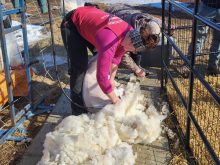Amid words of praise for a more consultative approach being taken by federal bureaucrats on controlling bovine tuberculosis in and around Manitoba’s Riding Mountain National Park, MPs last week still heard complaints about the way cattle farmers are treated.
The Canadian Food Inspection Agency also came in for criticism about its tendency to lecture rather than listen.
The House of Commons agriculture committee travelled to Dauphin, Man., Oct. 3 to hear how federal agencies and local groups are working to contain the disease that has cost the local livestock economy millions of dollars because infected wildlife in the park have passed the disease to some farms.
Read Also

Charges laid after cattle theft
Saskatchewan RCMP lay two charges against a man after six cattle went missing.
“Cattle, elk and bison producers around Riding Mountain National Park are fully supportive of eliminating bovine TB in our region and although progress has been made in eliminating the disease, producers’ financial and emotional concerns have not been adequately addressed,” Riding Mountain liaison committee board member Calvin Pawluk told MPs.
He said farmers should be compensated for the cost of presenting their animals for testing and counselling services should be made available to farmers whose herds have been quarantined or ordered destroyed.
Betty Green, past president of the Manitoba Cattle Producers’ Association, praised bureaucrats from agriculture departments, Parks Canada and CFIA for their work but she noted that they all get paid.
“Some additional assistance to the producers would be a clear signal that the government recognizes the importance of their ongoing contribution.”
If testing this winter produces no new cases of TB for the third consecutive year, the area will be declared TB-free for the first time since 1997.
















